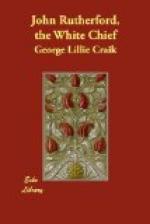Koran, and that the number of the punishments
is very considerable. My informants considered
that there could be no less than fifty or sixty
men eaten in a year, and this in times of peace;
but they were unable to estimate the true extent,
considering the great population of the country;
they were confident, however, that these laws were
strictly enforced wherever the name of Batta was
known, and that it was only in the immediate
vicinity of our settlements that they were modified
and neglected. For proof, they referred me to
every Batta in the vicinity, and to the number
of skulls to be seen in every village, each of
which was from a victim of the kind.
With regard to the relish with which the parties devour the flesh, it appeared that, independent of the desire of revenge which may be supposed to exist among the principals, about one-half of the people eat it with a relish, and speak of it with delight; the other half, though present, may not partake. Human flesh is, however, generally considered preferable to cow or buffalo beef, or hog, and was admitted to be so even by my informants. Adverting to the possible origin of this practice, it was observed that formerly they ate their parents when too old for work; this, however, is no longer the case, and thus a step has been gained in civilization. It is admitted that the parties may be redeemed for a pecuniary compensation, but this is entirely at the option of the chief enemy or injured party, who, after his sentence is passed, may either have his victim eaten, or he may sell him for a slave; but the law is that he shall be eaten, and the prisoner is entirely at the mercy of his prosecutor.
The laws by which these sentences are inflicted are too well known to require reference to books, but I am promised some Ms. accounts which relate to the subject. These laws are called huhum pinang an,—from depang an, to eat—law or sentence to eat.
I could give you many more details, but the above may be sufficient to show that our friends the Battas are even worse than you have represented them, and that those who are still sceptical have yet more to learn. I have also a great deal to say on the other side of the character, for the Battas have many virtues. I prize them highly.
FOOTNOTES:
[Footnote D: At the extreme north of the Philippine Islands.]
[Footnote E: Hawaii.]
[Footnote F: Phormium tenax.]
[Footnote G: mere.]
[Footnote H: Nicholas’s “Voyage to New Zealand.”]
[Footnote I: The transport “Boyd” was taken by Maoris and burned at Whangaroa Harbour in 1809. Most of the people on board were massacred, there being only four survivors out of seventy souls.]
[Footnote J: William Marsden, who was sent out from Dublin to Sumatra, about 1775, as a writer in the East India Company’s service.]




